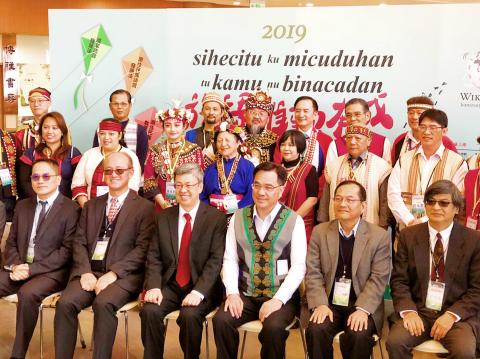The Sakizaya language, which is listed by the Council of Indigenous Peoples as an endangered language, was on Nov. 22 added to Wikipedia as a language option thanks to efforts to preserve and promote the Aboriginal language.
The Sakizaya people, officially recognized in 2007 as the 13th Aboriginal community in Taiwan, has a population of only 974 nationwide, making it difficult for speakers of the Sakizaya language to pass it down to younger generations, the council said.
Tuku Sayion, a Sakizaya and principal investigator for the language preservation project, on Monday last week told a conference about the development of Aboriginal languages that his team has since 2015 made efforts to make the Sakizaya language available on Wikipedia.

Computer terms, such as “visualization” and “program code,” took the most time to translate, as corresponding vocabulary does not exist in the Sakizaya language, he told the conference held at National Chengchi University.
There are about 3,600 Wikipedia entries in the Sakizaya language, with an edit count of more than 60,000 and a word count reaching 2 million, he added.
Atayal and Amis communities also expressed an interest in incorporating their native languages into Wikipedia, but that project has ground to a halt due to the difficulty in translating modern computer terms, said Lim Siu-theh (林修澈), the project’s co-principal investigator and professor emeritus at National Chengchi University’s ethnology department.
The Atayal and Amis are among Taiwan’s 16 officially recognized Aboriginal groups.
Vice President Chen Chien-jen (陳建仁), who attended the conference, said that Taiwan’s diverse culture and languages demonstrate the prosperity of a liberal and democratic nation, adding that the availability of the Sakizaya language on Wikipedia would help the world to learn about the language.
President Tsai Ing-wen’s (蔡英文) administration has promoted transitional justice for Aborigines since she assumed office in May 2016, especially the conservation of Aboriginal languages and cultures, such as the enactment of the National Languages Development Act (國家語言發展法) in January and amendments to the Education Act for Indigenous Peoples (原住民族教育法) in June, Chen said.
The council has launched a mentoring program to preserve indigenous languages, Council of Indigenous Peoples Minister Icyang Parod said.
In the program, one or two students are assigned to a mentor, who teaches them an Aboriginal language, including the Kanakanavu, Saaroa and Thao languages, Icyang said.
The council is also planning to establish a foundation early next year for the development of indigenous languages, which would be the nation’s first such research institute, he said.
Aboriginal students who pass indigenous language exams would receive certification, which could be used to apply for government subsidies to study abroad, he added.

The manufacture of the remaining 28 M1A2T Abrams tanks Taiwan purchased from the US has recently been completed, and they are expected to be delivered within the next one to two months, a source said yesterday. The Ministry of National Defense is arranging cargo ships to transport the tanks to Taiwan as soon as possible, said the source, who is familiar with the matter. The estimated arrival time ranges from late this month to early next month, the source said. The 28 Abrams tanks make up the third and final batch of a total of 108 tanks, valued at about NT$40.5 billion

Travel agencies in Taiwan are working to secure alternative flights for travelers bound for New Zealand for the Lunar New Year holiday, as Air New Zealand workers are set to strike next week. The airline said that it has confirmed that the planned industrial action by its international wide-body cabin crew would go ahead on Thursday and Friday next week. While the Auckland-based carrier pledged to take reasonable measures to mitigate the impact of the workers’ strike, an Air New Zealand flight arriving at Taipei from Auckland on Thursday and another flight departing from Taipei for Auckland on Saturday would have to

A group from the Taiwanese Designers in Australia association yesterday represented Taiwan at the Midsumma Pride March in Melbourne. The march, held in the St. Kilda suburb, is the city’s largest LGBTQIA+ parade and the flagship event of the annual Midsumma Festival. It attracted more than 45,000 spectators who supported the 400 groups and 10,000 marchers that participated this year, the association said. Taiwanese Designers said they organized a team to march for Taiwan this year, joining politicians, government agencies, professionals and community organizations in showing support for LGBTQIA+ people and diverse communities. As the first country in Asia to legalize same-sex

MOTIVES QUESTIONED The PLA considers Xi’s policies toward Taiwan to be driven by personal considerations rather than military assessment, the Epoch Times reports Chinese President Xi Jinping’s (習近平) latest purge of the Chinese People’s Liberation Army (PLA) leadership might have been prompted by the military’s opposition to plans of invading Taiwan, the Epoch Times said. The Chinese military opposes waging war against Taiwan by a large consensus, putting it at odds with Xi’s vision, the Falun Gong-affiliated daily said in a report on Thursday, citing anonymous sources with insight into the PLA’s inner workings. The opposition is not the opinion of a few generals, but a widely shared view among the PLA cadre, the Epoch Times cited them as saying. “Chinese forces know full well that